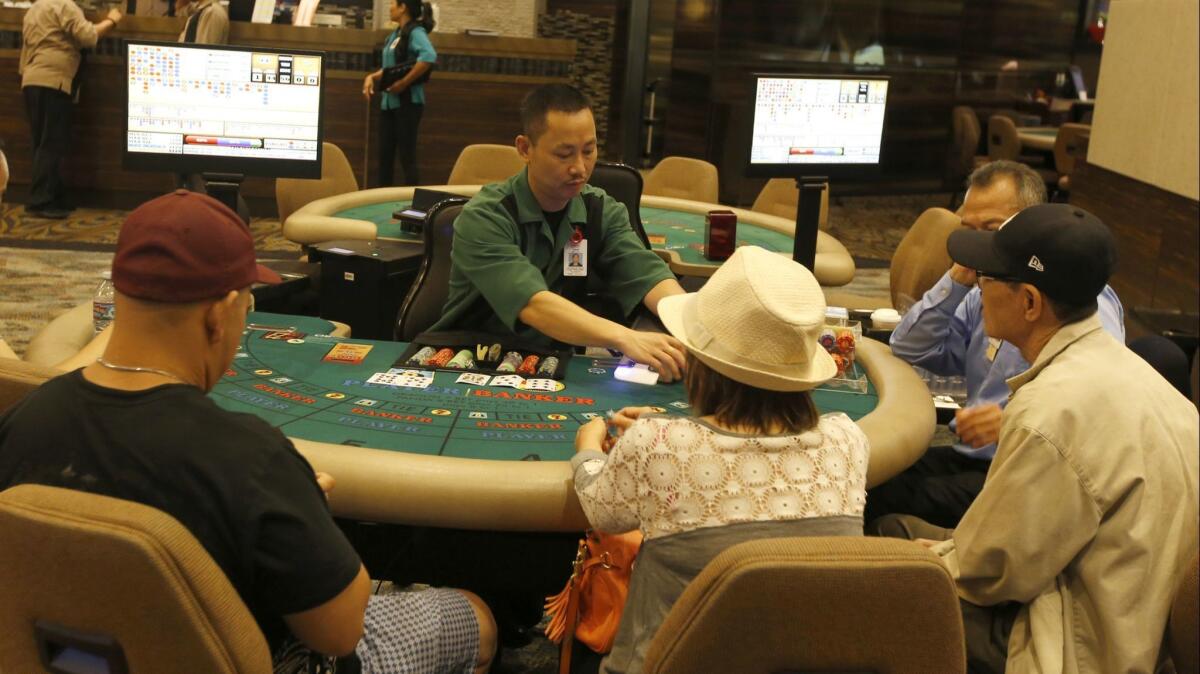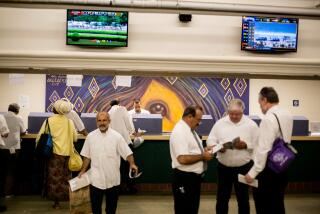Commerce Casino employee presumed positive for coronavirus as some California card rooms close

- Share via
SHINGLE SPRINGS, Calif. — The action was intense Friday at a baccarat table inside the Red Hawk Casino as eight players, most of them elderly, sat elbow to elbow placing bets ahead of the next deal.
Nearby, hundreds of other bettors worked the slot machines in the huge tribal-run gambling hall as cigarette smoke and the jangling sound of jackpots hung in the air.
For the record:
2:12 p.m. March 14, 2020The original version of this story incorrectly said that California’s 86 licensed card clubs have 8,000 employees and draw more than 20,000 visitors per day. The employee and visitor figures apply to the four card clubs closing in L.A. County.
Recognizing the health risks of such activity during the coronavirus outbreak, six of California’s largest card clubs and one Native American casino said Saturday that they plan to temporarily close their doors, while other gambling venues that remain open, including the Red Hawk Casino, face new state guidance aimed at preventing the spread of the virus.
One of the six card clubs, Commerce Casino in Commerce, said Saturday that it had also learned that an employee had tested presumptive positive for COVID-19.
Along with Commerce Casino, doors are being shut this weekend at the Gardens Casino in Hawaiian Gardens, Bicycle Casino in Bell Gardens and Hollywood Park Casino in Inglewood, the businesses said in a statement, noting the actions came after Gov. Gavin Newsom recommended a halt to public gatherings of 250 people or more and social distancing of six feet between people in public.
“In light of the Governor’s directive, as well as the nature of this unprecedented threat to public health, the casinos will close operations beginning this weekend,” the four casinos said in a written statement. “This closure will be temporary and all plan to re-open as soon as possible based upon the best available information. We believe that every business should put public health and the safety of people above profits …”
The plan to close Commerce Casino at noon Saturday was made before its operators learned that a new employee tested presumptive positive for COVID-19, said spokesman Eric Rose, who noted that the employee is receiving medical treatment and has self-quarantined.
Also closing Saturday were two San Jose card clubs, Casino M8trix and Bay 101 Casino, with the latter saying it will be shuttered at least until April 4.
Late Saturday, the Pechanga Resort Casino in Temecula announced it was also temporarily closing effective Monday due to the COVID-19 pandemic through the end of the month “for the health and safety of our Team Members, Tribal Members, and guests,” said Mark Macarro, chairman of the Pechanga Band of Luiseno Indians. No employees at the resort have tested positive for COVID-19, Macarro said.
The gambling industry is a big player in the state economy, generating about $8 billion annually after winnings, according to state officials. The four Los Angeles County card clubs that are closing employ 8,000 workers and serve more than 20,000 patrons per day.
California also is home to 63 casinos operated by Native American tribes. The businesses can pose health challenges at a time of virus pandemic, health experts say.
There are particular concerns at casinos that allow smoking and operate slot machines, attracting a large elderly clientele.
“Certainly the elderly are at greater risk,” said Elisa K. Tong, a general internist with UC Davis Health, adding that “smoking harms the immune system and can make the body less successful at fighting disease.”
While many public gathering spots including concert halls and amusement parks have been shut down or subject to restrictions to prevent spread of the coronavirus, crowds continue to flock to casinos.
For tribes that operate casinos, including the Shingle Springs Band of Miwok Indians, federal law provides sovereignty that limits the ability of the state to dictate how they operate on Indian land, according to legal experts.
“They are not bound to follow any state decree unless Congress orders them to,” said gambling law expert I. Nelson Rose, professor emeritus at Whittier Law School. “Tribes could, of course, voluntarily agree, similar to what Disneyland did.”
Gov. Gavin Newsom acknowledged Thursday that the tribal casinos require special consideration.
“We’ve been meeting with our partners in our tribal nations,” Newsom said. “The complexity of their unique circumstances requires additional conversation, a different kind of engagement, and in real time we’re in those conversations and engagement.”
But new guidelines released late Friday urge all gambling venues to limit the number of customers in single rooms or equivalent space to 250 or fewer, and increase the frequency of cleaning chips, shuffling machines and playing cards.
The guidance also asks gambling halls to make sure social distancing standards are met for non-family members and eliminate marketing that targets vulnerable populations and people at higher risk of serious illness from COVID-19.
State officials acknowledge the sovereignty issues but hope tribal casinos will follow their guidance.
So far, most tribes are keeping their casinos operating, while taking other actions to address public concerns, including stepped-up disinfecting of gambling equipment.
The new state guidelines are being followed at the Thunder Valley Casino Resort in Lincoln, which is operated by the United Indian Community, said spokesman Douglas Elmets.
The casino is consulting with the National Indian Gaming Commission on best practices to keep patrons safe, and is working with government agencies to pursue “concrete steps to confront this threat in a responsible but rational manner as we learn more about the virus,” Elmets said.
Tribal officials withShingle Springs did not respond Saturday to questions about whether they would follow the new state guidance.
California tribes wield significant political influence at the state Capitol, spending millions of dollars annually on campaign contributions and lobbyists. Tribal casino operators contributed more than $250,000 to Newsom’s 2018 campaign for governor, with eight tribes giving the maximum $29,200 each including the Pechanga Band of Luiseno Indians, Shingle Springs Band of Miwok Indians and San Manuel Band of Mission Indians.
At the Red Hawk Casino in Shingle Springs, patrons scoffed at the idea that gambling halls should be shuttered, with many saying they are willing to bet that the news on the virus is overblown.
“I don’t panic and I will be back,” one man said as he left the casino. A woman who identified herself as Penny and who made the hourlong trip from Elk Grove, said crowded shopping malls should be shuttered before casinos close their doors.
“I come here three times a week,” she said. “Don’t shut my place down.”
More to Read
Sign up for Essential California
The most important California stories and recommendations in your inbox every morning.
You may occasionally receive promotional content from the Los Angeles Times.










